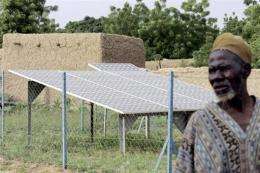400-bln-euro plan to pump African solar power to Europe

Twelve European companies launched a 400-billion-euro (560-billion-dollar) initiative on Monday to plant huge solar farms in Africa and the Middle East to produce energy for Europe.
The consortium says the massive project could provide up to 15 percent of Europe's electricity needs by 2050.
Engineering giants ABB and Siemens, energy groups E.ON and RWE and financial institutions Deutsche Bank and Munich Re are among the companies which signed a protocol in Munich.
"Today we have taken a step forward" towards the project's realisation, said Nikolaus von Bomhard, head of the reinsurance giant Munich Re, which hosted the signing.
The Desertec Industrial Initiative (DII) would build solar-power generators from Morocco to Saudi Arabia and pump electricity to Europe via underwater cables.
It would also provide a "substantial portion of the power needs of the producer countries," the Desertec foundation said in a statement, and transform sea water into drinking and irrigation water for local populations.
Munich Re board member Torsten Jeworrek said the European companies involved had pledged to work "as equals in a sincere and fair" manner with producer countries.
For Jordan's Prince Hassan ibn Talal: "The partnerships that will be formed across the regions as a result of the Desertec project will open a new chapter in relations between the people of the European Union, West Asia and North Africa."
Many details must still be worked out however, including where to install the plants, when the power would come on and how much it would cost, potential profits, political stability in some areas and of course, financing.
Under the protocol, a Desertec study office to be established by October will have three years to elaborate plans to create the network of solar farms.
Representatives of the Arab League and the Egyptian energy ministry also attended the signing of the protocol.
Other companies invoved are the Spanish firm ABENGOA Solar and the Algerian conglomerate Cevital along with several German banks and engineering companies.
The Sueddeutsche Zeitung newspaper said in June that electricity could begin flowing to Europe within 10 years.
It quoted a Siemens spokeswoman as saying the solar farms could generate up to 100 gigawatts of electricity, the equivalent of 100 power plants.
Max Schoen, president of the German association of the Club of Rome, said on Monday: "The establishement of DII is a giant leap by industry for the lasting production of human life."
While German Chancellor Angela Merkel and European Commission president Jose Manuel Barroso have hailed the initiative however, others have voiced criticism.
German Social Democratic deputy Hermann Scheer told AFP it was not necessary to go to North Africa to collect the sun's rays, and added: "We could invest the 400 billion euros here" in the recession-hit eurozone.
He also preferred a network of decentralised operators that produced renewable energy from many sources rather than having one key project in the hands of major corporations.
Others doubt that producer countries would fully benefit from a plan designed with Europe in mind, leading the business daily Handelsblatt to warn of potential "eco-colonialism."
(c) 2009 AFP















